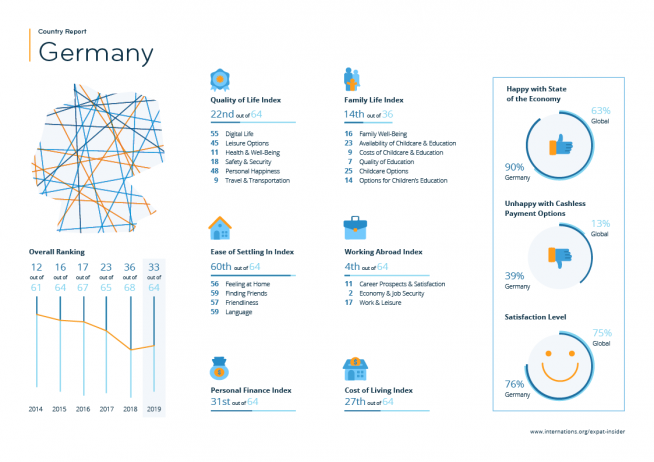Living in Germany: Job Opportunities Come at a Social Price
- Germany moves up four places to rank 3rd out of 64 for job security.
- Close to nine in ten expats (88%) are satisfied with the transportation infrastructure.
- Germany ranks in the bottom 10 for ease of settling in for the third year in a row.
- 64% of expats were concerned about the language barrier before moving to Germany.
- Only Austria and Switzerland have an even unfriendlier attitude towards families with children.
- 59% say moving abroad has made them happier (vs. 61% globally).
Plentiful Work Opportunities for Expats
Germany continues to prove an excellent destination for expats looking to further their career abroad, rising four ranks in 2019 to fourth place in the Working Abroad Index. The country receives outstanding ratings for its economy and job security, ranking in second place worldwide, only behind Luxembourg. Exactly nine in ten expats (90%) are satisfied with the state of the German economy, which is 27 percentage points above the global average (63%).
I feel like I have an open door for better job opportunities.
Expats who are happy with their life in Germany name being satisfied with their jobs as one of the main reasons for this, with a share of 46% choosing this answer. One French expat writes: “Germany is an excellent place to work, with many opportunities to get jobs and do business.” Not only does Germany offer excellent job prospects, it also seems to provide convenient working hours: 72% of working expats are happy with their hours, compared to 62% globally.
Excellent Healthcare and Education Options
Families in Germany are becoming increasingly satisfied: the country rises four places in the Family Life Index to rank 14th out of 36 destinations in 2019. Parents are particularly happy with their children’s health, with almost nine in ten (89%) satisfied, twelve percentage points above the global average (77%). In fact, Germany ranks inside the top 10 for this factor (7th).
The country also offers great education: Germany ranks seventh worldwide regarding the quality and eighth for affordability. Close to three-quarters of expats raising children in Germany (73%) rate the latter factor positively — worldwide, only about half the parents (49%) say the same. A Colombian respondent in Germany shares: “I like the security, the health, and education system. They offer the possibility of having a better future for my children.”
Despite the positives, some families continue to feel unwelcome in Germany: the country sits in 34th place out of 36 countries in terms of there being a friendly attitude towards families with children, only performing better than Austria (35th) and Switzerland (36th) in this regard.
Connected through Transportation but Struggling Digitally
Germany offers excellent travel possibilities, ranking 8th out of 64 countries worldwide for this factor. This is helped by its excellent transportation infrastructure, which almost nine in ten expats (88%) rate positively, compared to just 68% globally. More than half (51%) even say it’s excellent. One American expat names “being able to travel to beautiful countries that neighbor Germany” as one of his favorite things about life there.
Difficulties with paying with a card, slow internet, and bad phone reception.
However, a Polish expat also points out the “difficulties with paying with a card, slow internet, and bad phone reception”. These are just some of the reasons why Germany slips into the bottom 10 (55th) in the Digital Life subcategory in 2019. Expats find it particularly difficult to pay without cash: almost two in five expats (39%) rate this factor negatively, exactly three times the global average (13%). Accessing high-speed internet at home also seems difficult, as over a quarter (26%) struggle with this, eleven percentage points above expats globally (15%).
Settling In Still Proves Problematic
Germany finishes in the bottom 5 in the Ease of Settling In Index for the third year in a row, ranking 60th out of 64. Expats find it particularly difficult to make local friends: over half of expats (55%) say they struggle with this, 16 percentage points above the global average (39%). In fact, the country has only managed to finish outside the bottom 10 for this factor once in the last five years (57th out of 67 countries in 2017). What is more, almost four in ten expats (39%) say they were concerned about not being able to find friends when moving to Germany, twelve percentage points above the global average (27%).
It’s difficult to socialize and make new friends here.
Socializing is made even more difficult for expats by a seemingly unfriendly population — over a quarter of expats (27%) rate the friendliness of the German population negatively, compared to a global average of 16%.
Language Barrier a Daunting Proposition
The challenge of building friendships with locals may well be exacerbated by a lack of local language skills. Germany ranks 59th out of 64 countries in the Language subcategory, with over half of respondents (54%) saying it is difficult to live in Germany without knowing the local language. So, it seems hardly surprising that one British expat names “not speaking German and it being a difficult language to learn” as some of the worst things about life in Germany. Close to two-thirds of expats (64%) also say that the language barrier was one of their main concerns before moving to Germany. Only expats in South Korea (69%) and Japan (64%) are equally or even more likely to say this.
Higher Incomes Improving Financial Situations
One Ukrainian expat names her “stable and competitive income” as an advantage of living in Germany. Incidentally, she is not alone, as over six in ten working expats (61%) say they earn more in Germany than they would in their home country. For close to three in ten (29%), their income is even a lot higher than back home. Overall, Germany has moved up three places to rank 31st out of 64 countries in the Personal Finance Index. Close to seven in ten expats (68%) are satisfied with their current financial situation.




